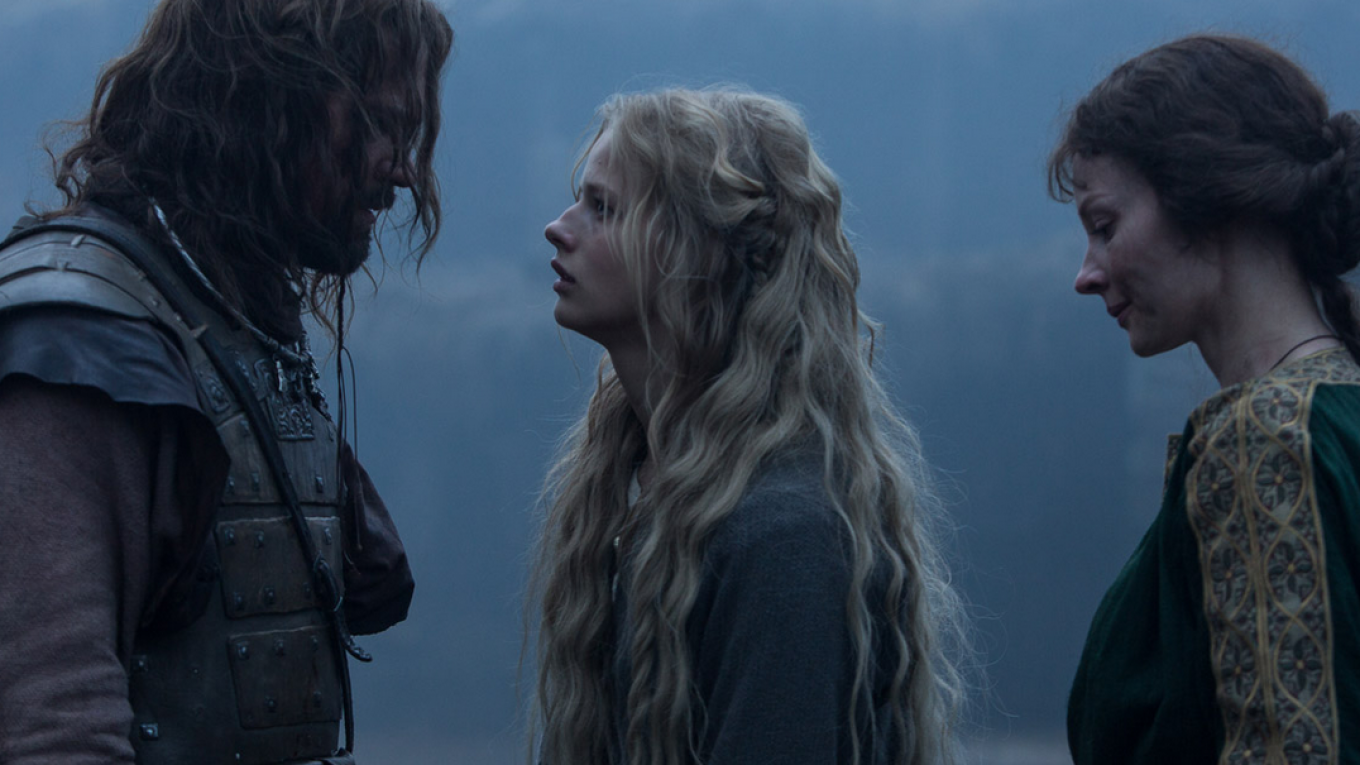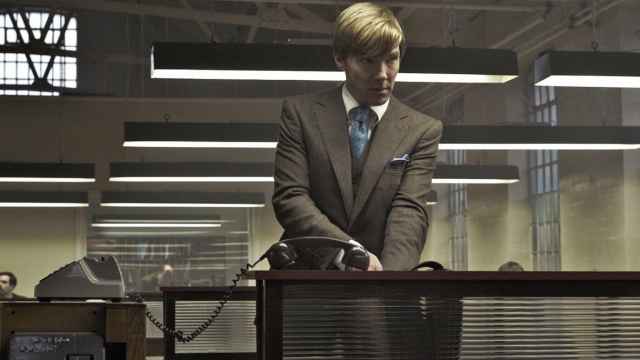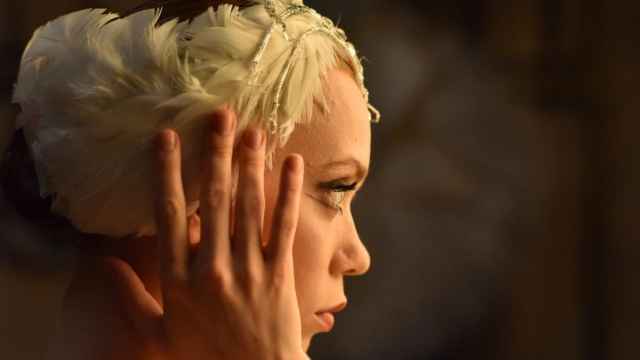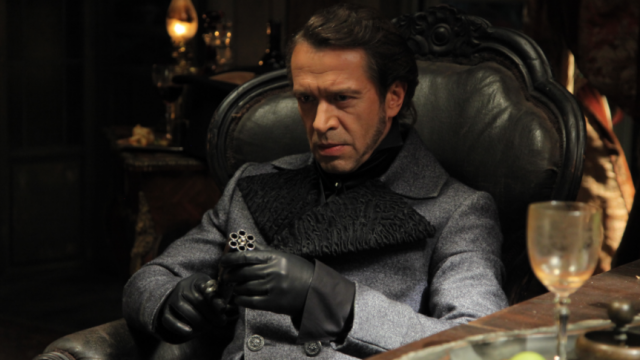Earning a record-breaking billion rubles in nine days, the historical Russian film “Viking” is confidently marching to the number one spot at the box office. It may even displace the highest-grossing Russian film ever — Fyodor Bondarchuk’s WWII action film, “Stalingrad.” The Nordic-themed hit was produced by Konstantin Ernst, director general of Russia’s Channel One, and directed by Andrei Kravchuk, known for his biopics on civil war-era White Russian leader Alexander Kolchak, and the Soviet cult singer-songwriter, Vladimir Vysotsky.
“Viking” tells the story of Prince Vladimir, better known today as Vladimir the Great, who is credited with bringing Christianity to Kievan Rus in the late 10th century. The movie opens during something of a state-sponsored Prince Vladimir lovefest. The medieval leader has recently become one the most discussed Russian historical figures after the authorities put up a controversial monument to him in the center of Moscow. The original plan called for installing a 25-meter statue of the early leader on Vorobyovy Gory (Sparrow Hills), but was canceled under pressure from local residents. The current eight-meter monument now stands by the Kremlin walls on Borovitskaya Ploshchad, part of a UNESCO Heritage Site. The UN organization has yet to release a statement on the statue’s impact. In the meantime, Prince Vladimir stands solemnly at a central Moscow crossroads as Russia’s newest ancient hero.
Played by Danila Kozlovsky, known to western viewers for his roles in “Vampire Academy” and last year’s Russian blockbuster “Hardcore Henry,” Vladimir is depicted as a violent leader, who will stop at nothing to become the Grand Prince of Kiev. In one of the scenes where we first see Vladimir, he rapes his intended bride Rogneda (played by the rising star Alexandra Bortich) in front of her parents before brutally murdering them.
He then orchestrates the killing of his brother Yaropolk and takes his place as the supreme leader of the Kievan Rus. But then he meets the demure Irina, Yaropolk’s widow and a former Christian nun from Byzantium (played by Svetlana Khodchenkova, known outside of Russia for her roles in the remake of “Tinker, Tailor, Soldier, Spy” and “Wolverine”). Under her influence, Vladimir gradually becomes a different person, and in one of the final scenes he repents his misdeeds and is baptized into the Christian faith.
The film was released in two versions: a family
friendly one with an age restriction of 12+ and
an uncut version with a 18+ restriction. The
main differences in 12+ version are the absence
of nudity and less gore. Among the first viewers
of the movie were Russia’s President Vladimir
Putin and the Minister of Culture Vladimir
Medinsky. “Definitely interesting. I’d enjoy
watching it one more time,” the president was
quoted as saying.
Media Furor
The film was received with extremely mixed reviews in the mainstream Russian media and has caused an unusual amount of discussion on social media. Despite the presidents’s public approval, many viewers were unsatisfied with the way the Kievan Rus and its inhabitants were portrayed in the film. A group of activists started a petition on the Change.org web-site asking the government to ban the movie. They complained that the Russians’ ancestors were shown as unwashed barbarians in perpetually dirty clothing, and Kiev as little more than a small town full of hovels rather than real buildings. The petition also refers to scenes of sex and violence as unsuitable for young viewers.
There is, of course, virtually no evidence of how people lived in 10th century Kievan Rus or even what Kiev looked like. What little information historians have is based on the Primary Chronicle written by the monk Nestor more than a hundred years after the events described in the film. Little is known about Vladimir’s life apart from what’s described in the Primary Chronicle and a lot of it seems rather apocryphal, like the way he supposedly chose the Orthodox Christian faith after sending his emissaries to study all the major religions of the time.
The producers and screenwriters of “Viking”
certainly took a few liberties with the Primary
Chronicle. The major discrepancy is that a Scandinavian
warrior named Sveneld (played by the
formidable Maxim Sukhanov) is portrayed as
Vladimir’s mentor throughout the movie, while
the Primary Chronicle names the prince’s maternal
uncle Dobrynya as his tutor. The historical
Sveneld served Vladimir’s grandfather Igor and
father Svyatoslav and was long dead by the time
of the conflict between Yaropolk and Vladimir.
Critics noted a few other minor discrepancies in
the screen portrayal of the era, such as characters
using armor and weapons that didn’t match
archeological finds from the period.
Ancient Rus for Today’s Russia
But the main problem with the movie is that
it simplifies complex and largely unknown
historical events into a straightforward “sinner
to saint” story, making a clear, black-and-white
distinction between the dirty and violent pagans
and civilized Christians. Note that all the
sex scenes are with heathen Rogneda, while
intimacy with Irina is only hinted at, never
shown. Despite the petition’s claims that the
film is humiliating to Russia, it actually corresponds
to the “party line” of the government
and the Russian Orthodox Church.
A Message from The Moscow Times:
Dear readers,
We are facing unprecedented challenges. Russia's Prosecutor General's Office has designated The Moscow Times as an "undesirable" organization, criminalizing our work and putting our staff at risk of prosecution. This follows our earlier unjust labeling as a "foreign agent."
These actions are direct attempts to silence independent journalism in Russia. The authorities claim our work "discredits the decisions of the Russian leadership." We see things differently: we strive to provide accurate, unbiased reporting on Russia.
We, the journalists of The Moscow Times, refuse to be silenced. But to continue our work, we need your help.
Your support, no matter how small, makes a world of difference. If you can, please support us monthly starting from just $2. It's quick to set up, and every contribution makes a significant impact.
By supporting The Moscow Times, you're defending open, independent journalism in the face of repression. Thank you for standing with us.
Remind me later.






